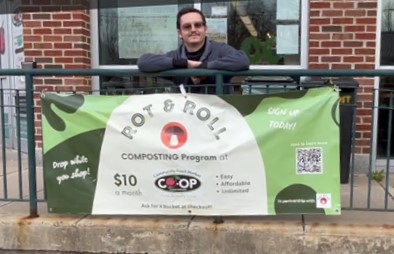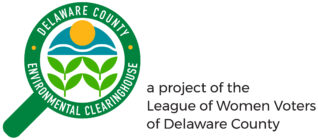Organization of the Month: Swarthmore Co-op

By Peg Christensen and Jodine Mayberry
The Swarthmore Co-op has been operating a community composting program for the last two and a half years that keeps tons of food waste out of landfills and creates a rich loam for area gardeners.
According to Produce Manager Vlad Stefanovitch, the way it works is this:
* Currently, homeowners pay a one-time charge of $12 to purchase a food waste bucket and $10-a-month fee to deposit their kitchen waste in bins provided in front of the Co-op. The Co-op maintains 8-10 bins to collect the waste, rotating them as they get full. Currently 43 homeowners subscribe.
* The Rot Star Compost organic waste removal service in Media picks up the waste and takes it to a site at Linvilla Orchards where the actual composting takes place.
* Another company, Kitchen Harvest, processes and bags the compost.
* paid subscribers to the program receive the resulting compost for free, no matter how much or how little food waste they have contributed. The public can buy 25-lb bags of compost for $10 at the Co-op, Linvilla or online at www.mykitchenharvest.com/.
The project is completely not-for-profit. Participants are charged whatever it costs the Co-op to carry it out. The charges may change in the future as costs fluctuate.
The Co-op is a 93-year-old grocery store on Dartmouth Avenue in Swarthmore that serves members and the public alike. Members pay a one-time buy-in and a monthly, quarterly or semi-annual fee to receive certain member benefits while the public simply shops there as at any grocery store.
Stefanovitch is a graduate of Strath Haven High School and Penn State University, earning a degree in agricultural science, with a focus on sustainability and international agriculture. He worked at the Co-op while in high school. He returned to it again after he graduated from college at the height of the COVID pandemic.
He said the composting project started in 2021 when the Co-op realized it had to do more to recycle its own food waste, generated by prepared foods, such as salads and sandwiches, and leftover produce.
The store was using composting bins for its own waste, then partnered with Kristin Giamra, founder of Rot Star Compost to expand the program.
It grew exponentially from there. In the first six months, starting in June 2022, the composting partners recycled 19,000 pounds of compostable food waste. In 2023, that number grew to 39,000 pounds.
Stefanovich expects the total to be even larger for 2024. He is still compiling the numbers and will announce the 2024 total in late April in conjunction with the Co-op’s Earth Day activities.
He says any Co-op shopper can sign up for the composting program. They do not have to be Co-op members. The store already has composting participants from Swarthmore, Nether Providence, Rose and Rutledge.
The whole premise of the program is to keep food waste out of the county landfill and the Reworld incinerator and recycle it for sustainable use.
Composting is not the only sustainability program the store runs. According to its website, the Co-op distributed 22,900 pounds of produce, dairy and baked goods to the community through Philly Food Rescue in 2023. New figures will be released for 2024.
It also switched to using biodegradable packaging for its deli sandwiches and fried foods in September 2023 and it works with more than 70 vendors to reduce the store’s carbon footprint while providing the store with resources to modernize its equipment, support its employees and serve the Swarthmore community.
For more information about the Co-op and its membership and sustainability programs, visit https://swarthmore.Co-op/

